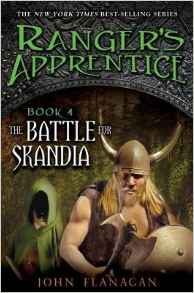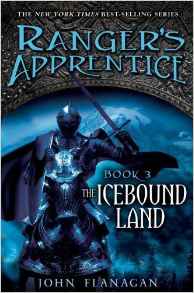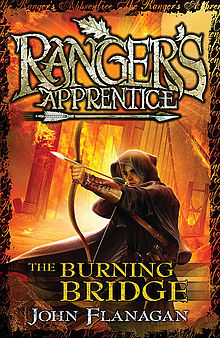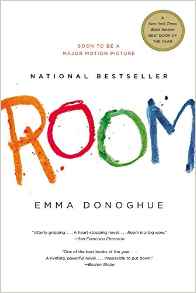In book four of the Ranger’s Apprentice series. Will and Evalyn have escaped thanks to Erak’s help, but have gone from the frying pan into the fire. The Tamujai are moving into the area. This is Jon Flanagan’s interpretation of the Huns. I don’t know that the Huns every tried to invade a Scandinavian country, but it’s an interesting story Mr. Flanagan tells with the Tamujai trying to invade Skandia to take over their ships. At the same time, I wonder if this move signals a leave from the fantasy world to historical fiction.
I had a love hate relationship with this book. While I was enjoying the world of Skandia, it became clear that the world of “Ranger’s Apprentice” is a Europe-esque world. Celtica, Gallica, Teutland, and Skandia are reiterations of Wales, France, Germany, and Scandinavia, respectively. While this doesn’t bother me in theory, in practice it means that this world isn’t so different from our own and the element of “fantasy” seems to loose its power. If I’m going to read historical fiction, I want to read historical fiction, not just a fantastical version of it. I’m just curious enough to see where Mr. Flanagan is going with book five.
Celtica, Gallica, Teutland, and Skandia are reiterations of Wales, France, Germany, and Scandinavia, respectively. While this doesn’t bother me in theory, in practice it means that this world isn’t so different from our own and the element of “fantasy” seems to loose its power. If I’m going to read historical fiction, I want to read historical fiction, not just a fantastical version of it. I’m just curious enough to see where Mr. Flanagan is going with book five.
The fact that some of these countries and people are based on actual peoples and cultures, it became uncomfortable. It seems to play into some stereotypes which flatten the characters and plays off our own conceptions of the cultures and societies associated with these “fantasy” countries in the series. The end of the book recovered some of the esthetic that first drew me to the book, but a lot of the characters are starting to feel flat to me. I’m looking forward to seeing how Mr. Flanagan can reinvigorate them.
 I’m starting to think the author writes the books in pairs, keeping the overall storyline in mind for the series. The story is engrossing, but there’s definitely a sense that there’s no rush to develop anything or bring anything to a close. That was a let down. I don’t like feeling like what I’m reading doesn’t have a purpose towards drawing the characters into fetcher conflict, development, or the conclusion of the story. The one bright side of this book was the fact that Evelyn takes charge while Will is in his drug stupor. She shows that women are courageous, resourceful, brave, and ingenious without acting like men. She keeps her own identity without sacrificing who she is for any of the male characters. It’s a good lesson for the obvious young male audience for this series.
I’m starting to think the author writes the books in pairs, keeping the overall storyline in mind for the series. The story is engrossing, but there’s definitely a sense that there’s no rush to develop anything or bring anything to a close. That was a let down. I don’t like feeling like what I’m reading doesn’t have a purpose towards drawing the characters into fetcher conflict, development, or the conclusion of the story. The one bright side of this book was the fact that Evelyn takes charge while Will is in his drug stupor. She shows that women are courageous, resourceful, brave, and ingenious without acting like men. She keeps her own identity without sacrificing who she is for any of the male characters. It’s a good lesson for the obvious young male audience for this series. This was a complicated read for me. On one hand I appreciated the style of writing. I was able to disappear into the plot and the characters. I could tear through page after page and not feel the time pass. On the other hand I wonder if people know that this isn’t a historically accurate book? Colson Whitehead takes us on a journey from a plantation in Georgia to…wherever Cora, the protagonist ends up. At first the book seems like it’s going to be similar to earlier novels of slaves escaping to the North. However, we get a big clue that this isn’t realistic fiction because Cora gets on an actual railroad, underground, in order to escape. This leads to further incidents along Cora’s journey that clue us in to the fantastical elements of the novel. The subtlety of the non-historical elements are so well done it’s hard to remember they never happened. This lead to my first problem with the novel. I’m afraid some will think that the scenes in South Carolina or the anti-slavery movement in North Carolina are true.
This was a complicated read for me. On one hand I appreciated the style of writing. I was able to disappear into the plot and the characters. I could tear through page after page and not feel the time pass. On the other hand I wonder if people know that this isn’t a historically accurate book? Colson Whitehead takes us on a journey from a plantation in Georgia to…wherever Cora, the protagonist ends up. At first the book seems like it’s going to be similar to earlier novels of slaves escaping to the North. However, we get a big clue that this isn’t realistic fiction because Cora gets on an actual railroad, underground, in order to escape. This leads to further incidents along Cora’s journey that clue us in to the fantastical elements of the novel. The subtlety of the non-historical elements are so well done it’s hard to remember they never happened. This lead to my first problem with the novel. I’m afraid some will think that the scenes in South Carolina or the anti-slavery movement in North Carolina are true.  Another excitingly quick paced read, this time we have a female protagonist join the gang evening out the male dominated cast. I was worried that once she appeared on scene that she might become the archetypal medieval female who’s pretty and smart, but doesn’t have much agency and who is included only to serve as the romantic interests of the male protagonists. Luckily Princess Cassandra hasn’t fallen into that trap…yet. She’s smart and witty, keeping her identity secret because she’s aware she could be used as a pawn in someone’s political machinations. She also makes it clear that she doesn’t need protection but also appreciates the camaraderie that Will and Horace offer her. As of yet, there’s not even a hint of romance, but I’m just waiting for that shoe to drop.
Another excitingly quick paced read, this time we have a female protagonist join the gang evening out the male dominated cast. I was worried that once she appeared on scene that she might become the archetypal medieval female who’s pretty and smart, but doesn’t have much agency and who is included only to serve as the romantic interests of the male protagonists. Luckily Princess Cassandra hasn’t fallen into that trap…yet. She’s smart and witty, keeping her identity secret because she’s aware she could be used as a pawn in someone’s political machinations. She also makes it clear that she doesn’t need protection but also appreciates the camaraderie that Will and Horace offer her. As of yet, there’s not even a hint of romance, but I’m just waiting for that shoe to drop. There’s a lot of the stock elements of a medieval lay, Arthur and his court, religious iconography (i.e. Holy Grail) and your random supernatural events. Oddly enough, Parzival ends up wandering the wilderness in order to complete his quest and restore himself back in good graces with society and he keeps running into his cousin. His cousin is a young woman who has lost her husband in a joust with Parzival’s rival. Throughout the who story she randomly encounters Parzival. I don’t know what was going on in Medieval culture, but a young woman who was without a male escort was really vulnerable. Yet she seems to be ok showing up in random places to confront Parzival. Weird.
There’s a lot of the stock elements of a medieval lay, Arthur and his court, religious iconography (i.e. Holy Grail) and your random supernatural events. Oddly enough, Parzival ends up wandering the wilderness in order to complete his quest and restore himself back in good graces with society and he keeps running into his cousin. His cousin is a young woman who has lost her husband in a joust with Parzival’s rival. Throughout the who story she randomly encounters Parzival. I don’t know what was going on in Medieval culture, but a young woman who was without a male escort was really vulnerable. Yet she seems to be ok showing up in random places to confront Parzival. Weird.  I haven’t been so engrossed in a book since I devoured the Hunger Games trilogy in a matter of days. However, Ranger’s Apprentice became the second book to have captured my attention so much I literally wanted to just rush home from work and read. The plot of the book seemed to tick off the boxes of things I look for in a book and it never lost its way.The underdog finds a purpose, a thrilling chase takes on life-or-death stakes, and ultimately we learn that heroes are usually the people we least suspect and they typically don’t plan to be a hero. I typically don’t like to read books that are type-written for specific genders. However, I will say that sometimes a book does it so subtly that it’s hard for me not to be taken in by it. This book is definitely a “guy” book in the sense that it understands what young adult guys are looking for in a book and crafts a story that addresses their needs.
I haven’t been so engrossed in a book since I devoured the Hunger Games trilogy in a matter of days. However, Ranger’s Apprentice became the second book to have captured my attention so much I literally wanted to just rush home from work and read. The plot of the book seemed to tick off the boxes of things I look for in a book and it never lost its way.The underdog finds a purpose, a thrilling chase takes on life-or-death stakes, and ultimately we learn that heroes are usually the people we least suspect and they typically don’t plan to be a hero. I typically don’t like to read books that are type-written for specific genders. However, I will say that sometimes a book does it so subtly that it’s hard for me not to be taken in by it. This book is definitely a “guy” book in the sense that it understands what young adult guys are looking for in a book and crafts a story that addresses their needs.